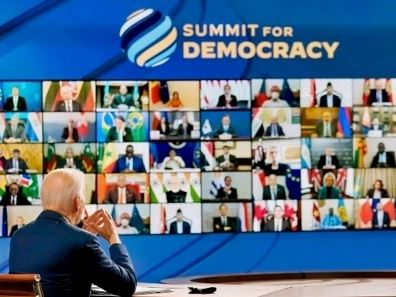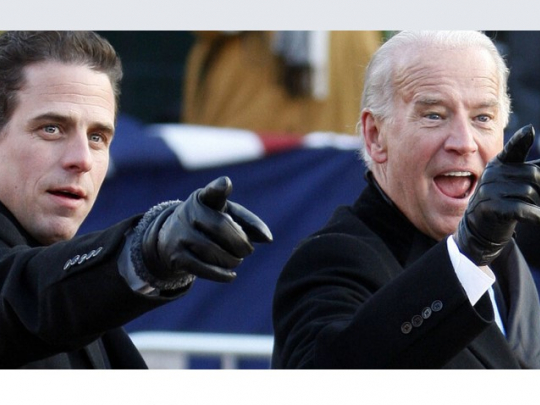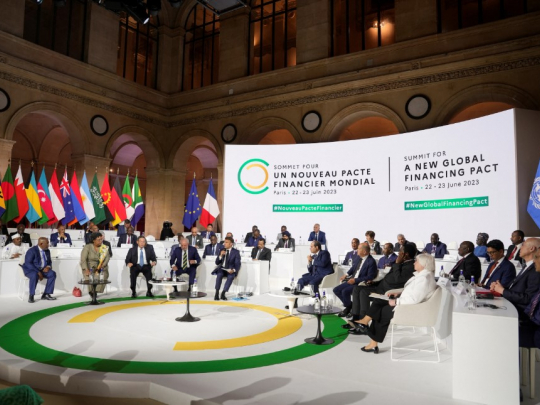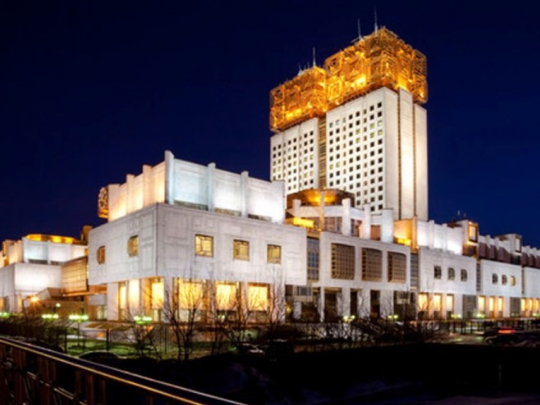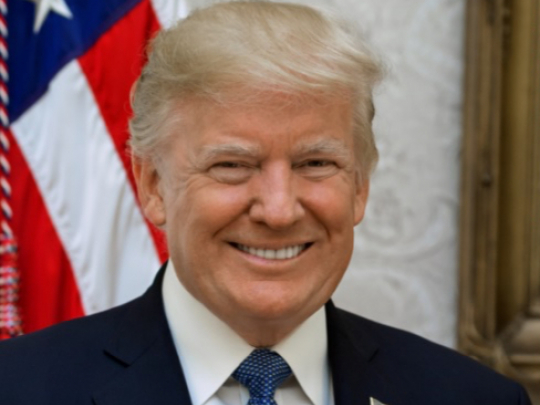There are no "common values" between Europeans and the US

The virtual summit for democracy organised from Washington is a gigantic qui-pro-quo. Many commentators have noted that it does not aim to promote a political regime, but to ideologically consolidate the military alliance behind the United States; a development that prepares new wars. Thierry Meyssan shows that, far from being hypocritical, Washington is on the contrary very clear in its objective. It is his partners who bear the blame by pretending to ignore that the words he uses do not have the same meaning for them.
The President of the United States, Joe Biden, has organised a virtual summit for democracy on December 9 and 10, 2021 [1]. It is clear that his objective was not only to improve democracies, but also and above all to divide the world into two: on the one hand, "democracies" that must be supported, and on the other, "authoritarian regimes" that must be fought. Russia and China were the first to be targeted, and they immediately challenged Washington’s hypocrisy and explained their philosophy of democracy [2].
We would like to examine the credibility of the US claim to be the "beacon of democracy", or in biblical terms, the "light that shines on the hill", from a Western perspective, rather than summarising the Russian and Chinese criticism. The Russian conception of democracy is exactly the same as that of other continental European states. China’s is very different. We will not deal with it here.
Our point is to show that, despite Nato propaganda, there are no "common values" between the US and continental Europe. They are two fundamentally different cultures, even if the EU elites are no longer culturally European, but largely ’Americanised’.

The US organised a Democracy Summit, not for all states, but only for its obedient allies.
REMARKS ON FORM
First of all, if the purpose of the summit was to "improve current democracies", it would not have been chaired from the White House, but from the United Nations. All nations could have participated, including those that are clearly not democracies, but are trying to become one.
Secondly, if the United States were the "beacon of democracy", it would not be presiding over this summit and handing out good and bad points, but would be participating on an equal footing with the other guests.
Instead, in its very form, this summit manifests ’American exceptionalism’ [3], i.e. the religious belief that the US is a power apart, ’like no other’, ’blessed by God to enlighten the world’.
HUGE MISCONCEPTIONS

The Rights of Man, a response to Edmund Burke’s attacks on the French Revolution, by Thomas Paine, Congressional Foreign Secretary during the American War (1776)
At the outset of the summit, President Biden acknowledged that no country is truly democratic; that it is an ideal towards which everyone strives. He said that in practice everyone could see setbacks (such as the attack on the Capitol on January 6, 2021) that were probably due to the arrival of a new generation. And that it was therefore necessary to put our hearts back into the work and to resolve these ’democratic setbacks’. However, this fine speech permits above all to give the impression of a consensus and to avoid clarifying the debate.
Everyone agrees that an excellent definition of democracy was given by President Abraham Lincoln: "Government of the people, by the people and for the people". But Lincoln never wanted to recognise ’popular sovereignty’. This ideal has never been attempted in the United States. Lincoln’s political action consisted first of promoting the privilege of the sole federal president to set tariffs (which was the cause of the Civil War), and then of abolishing slavery (which was the means to win that war). This is why, in American culture today, the word "democracy" is understood to mean only "political equality".
Similarly, the term ’civil rights’ does not refer to ’citizens’ rights’ at all, but to the absence of racial discrimination in accessing these rights. By extension, today the term is applied to discrimination against all minorities.
This misunderstanding has a long history. The journalist Thomas Paine, whose pamphlet Common Sense (1776) sparked the American Revolutionary War, was enthusiastic about the French Revolution. He wrote a violent pamphlet to explain the difference between the irreconcilable views of the United States, the United Kingdom and France on the Rights of Man (1792). It was the most widely read work in France during the Revolution. It earned him honorary French citizenship and election to the Convention. The Anglo-Saxons mean by the expression "human rights" the right of people not to suffer from the Reason of State and by extension from any form of state violence. On the contrary, France adopted the Declaration of the Rights of Man and of the Citizen; a programme that makes every citizen an actor in national political life and therefore protects him or her from the abuse of power.
Not only are we not all talking about the same thing when we talk about ’democracy’, but also when we talk about ’human rights’.
The United States has, admittedly, a superiority in its definition of freedom of expression. For them, this freedom must be total, so that all ideas can be expressed and the debate can choose the best one. In contrast, Latin countries do not recognise this freedom for the ideas of the defeated. Thus they criminalise the expression of Nazi racialism. By extension, since 1990, they have also banned the expression of all Nazi ideas that led to convictions at the Nuremberg trials. One thing leading to another, they now prohibit the mass murder of enemies using gas chambers like the SS Einsatzgruppen, as well as disputing that this procedure was also used in some concentration camps.
Freedom of religion is also a contentious issue. The United States sees it as an absolute, not recognising the right to refuse any religion. In contrast, Europeans speak of freedom of conscience, which includes all other forms of spirituality, including atheism. This difference has enormous practical consequences, with some non-continental European countries granting individual rights only through membership of a faith community. The United States, founded by a Puritan sect, has become a sectarian paradise. In fact, it is not possible for a follower to turn against his or her church if it abuses or manipulates him or her, whereas in Europe it is a legal means to fight against abuses of authority committed in a religious context.
Note that there is a corollary to the difference in human rights thinking. In the United States, given the experience of the British dictatorship of King George III and the US Constitution which organises a monarchy without a king or nobility, the People must maintain an armed force to protect themselves from possible abuses of power. This is why the trade in weapons of war is free in the country, while it is seditious in continental Europe.
Emperor Biden teaches his concept of "democracy" and "human rights" to his vassals.
A NOTE ON SUBSTANCE
Let us come to the heart of the matter. While admitting to being imperfect, the United States claims to be the "beacon of democracy". But is it a democracy?
If we take this word in its American sense of ’political equality’, we have to admit that this is not the case at all. There are huge political disparities, especially between whites and blacks, which are constantly reported in the press. President Biden has a huge task ahead of him. We have already explained that his approach to this issue, far from solving it, is actually making it worse [4].
If we take ’democracy’ to mean ’popular sovereignty’ everywhere else, then we must recognise that the US Constitution is not democratic at all; that the US has never been a democracy. The Constitution grants sovereignty to state governors and to them alone. Elections by universal suffrage may exist at the state level, but are optional at the federal level. Everyone remembers the election of President George W. Bush in 2000 when the US Supreme Court refused to recount the ballots in Florida on the grounds that it did not care about ascertaining the will of the Florida voters because the governor of that state (the brother of the alleged winner) had decided.
Let us remember equally that political parties in the United States are not citizens’ associations as in Russia, but are institutions of the federated states as was the single party in the Soviet Union. Thus the primary elections, which allow the selection of a party’s candidate, are not organised by the political parties themselves, but by the federal states that finance them.
Given that the United States is not a ’democracy’ in the common sense, but an oligarchy, that it fights only for ’civil rights’, it is natural that abroad it fights against ’popular sovereignty’ through coups d’état, ’coloured revolutions’ and wars. In doing so, their values are diametrically opposed to those of continental Europeans, including Russia.
However, American thinking has a positive consequence. Fighting for civil rights means fighting against certain forms of corruption. Washington considers it perfectly normal to secretly pay salaries to foreign politicians and finance their election campaigns. The State Department draws up lists of personalities to support with a good conscience and does not understand that these leaders are considered corrupt in their countries. In contrast, the United States fights kleptocracy, i.e. the theft of public assets by foreign leaders (not by US leaders who are exempt from their crimes by virtue of ’American exceptionalism’). In doing so, they sometimes help "democracy" in the continental European sense.
- Source : Thierry Meyssan




